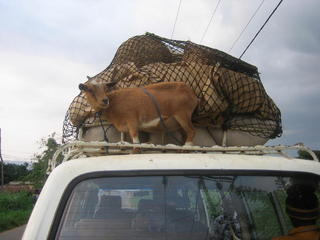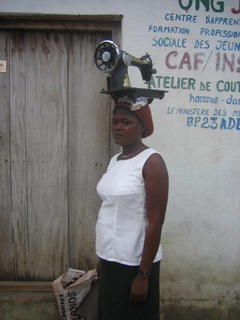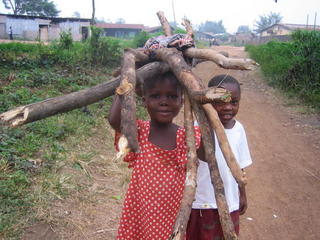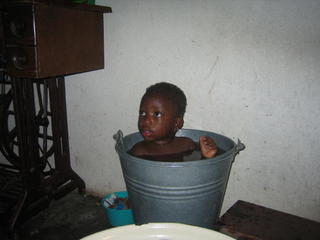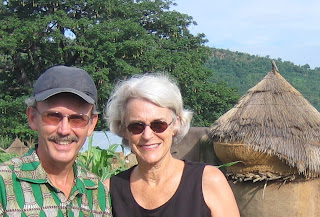Bonjour famille y amis,
(Two pictures at the bottom)
We write this from Atakpame, the town where we will be living starting in September. We have been sent for the week to start making living arrangements and getting to know the town. We are very pleased with the house where we will be living and the town itself, and have already met many people who have given us a warm welcome. It feels good. We are receiving a great deal of respect, due in large part to our age. It never felt so good to be so grey.
This week we have good internet connection, so we will send what I wrote a couple weeks ago about our first impressions of market day in our training village, Adeta. I write this in part so that those of you who will hopefully be visiting us will have an idea of what to expect. Visiting Africa may not be the exotic travel experience you were thinking. :)
Every village and town has one day a week that is designated as “market day,” the day where people come from all the outlying villages to sell their goods. It is different days in different villages. The larger towns, like the capital Lome, have it every day. Our first visit to the market in our village is hard to describe in any other way than as an “assault on the senses.”
The market, in this village of 7,000, brings in hundreds of vendors and shoppers. It is a very busy scene with vendors coming in hordes with their goods crammed in trucks and tied on the top of vehicles. Many walk for miles with whatever they are selling in a big container carried on their head. (Nobody seems to carry anything any other way. The women often have a baby tied on their back, and a big aluminum basin filled with charcoal, bread loaves, yams, colorful fabric yards called pagnes, or dried fish, but their hand are free). They walk ever so gracefully, even the children, a! nd we have already gotten used to seeing everything carried this way. If a man is coming home from work in the fields, he balances his machete on top of his head. Children as young as 5 or 6 may carry a small pail of food. I saw a woman carrying a good sized dining room table. Everything goes on the head!
But I digress…Everything revolves around market day in the villages. Streets are nearly impossible to travel. Loaded cars and trucks, motos (small motorcycles also used as taxis to get around) have the right of way and come quickly out of nowhere. It is dangerous. I feel like walking around with my bicycle helmet on (well, not quite…). The smell of diesel surrounds the large market area as people load and unload their goods. We must walk through the congestion to get to the heart of the market. Pike Place at its busiest time of year doe! sn’t come close to this experience. Hundreds of venders, mostly women, are selling everything from small piles of dried fish set on a display table or the ground (the flies are very attracted to this), to pots of boiling sauces (sorry, we haven’t had the stomach to find out what they might be made of yet), to unwrapped bars of soap used for our hand laundry, and piles of “dead yovo” clothes. (“Yovo” is a foreigner, especially American. The dead yovo aisles are full of piles of used clothing, and they are referred to as “dead” yovo, because why else would yovos not want these perfectly good clothes unless they were no longer alive? The clothing is thrift shop genre, and I have already purchased a well worn white tank top for about 30 cents (which I used to learn how to batik from a local artist.)
Interspersed with these stalls of curious foods and not so appetizing smells, we find venders selling fabrics in beautiful colors and designs. They are sold in units called pagnes which are about 2 yards each. They come in various qualities, and therefore prices, and this is one of the first things we learned to bargain for in French. Pagnes are what all the women wear. The poorest wear them wrapped around their waist like a sarong. Wealthier folks pay tailors, who are a thriving business, (as are the hairdressers) who can make them into quite stylish, well-fitted outfits. Men buy the pagnes as well. Wayne is having 2 shirts made today for a $5.00 fee from the tailor ($2.50 each). We paid about $4 each for good quality fabric. Place your orders if you want us to send you a shirt. These pagnes are what makes life so colorful here, as even the poorest of the poor of all ages wear them in some form or another. They are worn until they no longer hold together, but still seem to maintain color. The clotheslines on wash days are pleasant to pass by.
There are also male vendors at the market, but not many. They are in the outlying stalls and have electronic equipment like radios which look like they might work, electric fans, batteries and various auto/moto parts.
It’s hard to describe the impact the market had on us the first time we experienced it. I felt horribly overwhelmed, truly, it was almost like being assaulted (OK, I’ve never been assaulted, but this is the only word which seems to fit). An assault on the senses. Aside from the sights and smells and crowds, the noise level is tremendous. Add to that the language/cultural barrier. The good news is that on subsequent visits we have become more accustomed to it, and now look forward to market day and have traveled to a larger neighboring town on their market day. We have actually bee! n able to bargain for pagnes in our newly acquired French: “C’est trop cher!! Diminuez le pris, s’il vous plait!”
Speaking of French, we know some of you are probably curious how we are doing. Although we wish it was coming faster, when we realize that we can form sentences (albeit limited in vocabulary) using 3 verb tenses, we realize we are indeed making progress. We’re working as a team on this….I seem to be speaking more, and Wayne seems to be understanding more. Some things don’t change. Anyone surprised?
So, I hope our little description of market day will encourage those of you who are on the edge of “to visit or not.”
Our hometown (“post” in Peace Corps lingo) in Togo, Atakpame, is quite scenic, nestled in the hills, and our home is (will be, starting September) well above West African standards and very comfortable. We have a fairly steep rocky hill to get to it, but the view is worth the effort and the calories burned will hopefully help negate all the carbohydrates we are eating. The food is quite palatable, although I have to add we are still being careful and haven’t totally gotten into what the natives are purchasing from the street vendors. But we are getting a little more adventurous every day as our digestive systems are acclimating.
We are loving your emails (for those of you who have not written, please feel guilty). Our trips to the internet cafes are highlights of our days. And now in Atakpame, we have found a route to the internet café that goes by the Fan Milk store – the best and only ice cream in town. We are lucky to have a store. In most towns, they are sold from coolers attached to bicycles and it is only by chance that you will see one when you want one. They are a little like the good humor man. So now we have ice cream (well it’s really frozen yogurt) AND your emails to look forward to as we walk! about town.
We are missing you all and feel abundantly blessed to have you as family and friends and know that you are thinking of us and praying for us . Sometimes Africa does not seem so far off, and 2 years not so long. Then again, sometimes it does! :) So, please, we want to know what’s going on in your lives, also, so that when we ret! urn we won’t feel like foreigners, the yovos that we are here in Africa. (And that’s a whole other email).
Love to you all---
Cate and Wayne

























